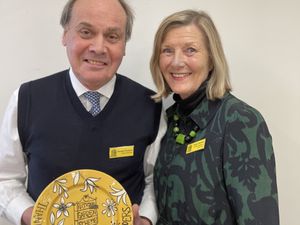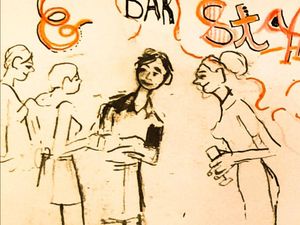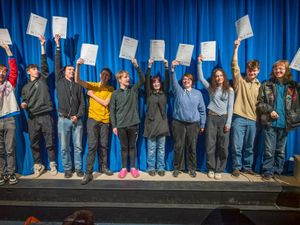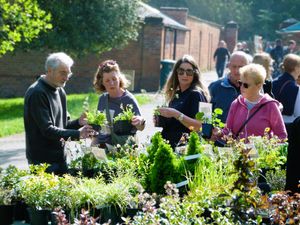Songs dating back to 17th century collated in £90k heritage project
Songs dating back to the 17th century that were sung by workers in local fields have been collected as part of a major £90,000 heritage project.
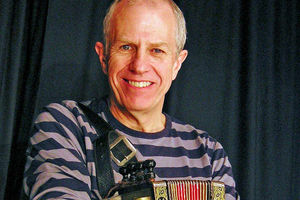
Local folk virtuoso John Kirkpatrick, a former BBC 2 Folk Award Winner, has collated 20 songs for the Shropshire Tune Archive, including The Shrewsbury Rakes, General Hill's Favourite and the intriguingly-named Lumps of Pudding, which generates from High Ercall.
The initial 20 tunes will be available to people of all ages so that they can find out more about the culture of Shropshire from years gone.
John, who lives near Bishop's Castle, has recorded and transcribed the 20 dance tunes that will form the basis of an online teaching resource pack including music, notes and short video demonstrations. It will be available to Shropshire schools and others to use in their teaching.
He said: "Trawling through the musical history of Shropshire has unearthed some great music that tells the story of life in our county at different times.
"From a tune that was played as the crowd would process to the Shrewsbury Show in the 1800s to several dance tunes from a carpenter in Newport, there is some wonderful music that will now be preserved forever and shared with a new audience.
"As a musician, it was a privilege to be able to record this material and I hope that the archive will be put to good use for the next generation of Shropshire musicians."
The Shropshire Tune Archive resource pack will be available to download in early 2017. It is part of a wider, £90,000 project led by Shrewsbury Folk Festival called All Together Now that is creating opportunities for musicians, dancers, schoolchildren and communities across Shropshire to get involved in world music and dance.
All Together Now has taken place over the last two years to introduce a new audience to folk and world music. It received an £86,410 investment from the National Lottery through Arts Council England, a £5,000 Arts Development award from Shropshire Council, and £2,000 from Shrewsbury Town Council. The festival met the remaining cost.
The new Shropshire Tune archive features songs that will resonate with locals.
Mr Kirkpatrick said the first song was called Shrewsbury Quarry. He said: "It is the only dance tune given in Charlotte Burne's book from the 1880s – Shropshire Folk Lore. The tune was played in procession on the way to The Shrewsbury Show, held at Kingsland, and consequently for dancing once all had arrived. The usual name for the tune is La Belle Catherine, and it is included in almost every collection of dance music throughout the nineteenth century.
"Several of the other melodies with place names in the title come from the masses of country dance collections (each dance given with its appropriate tune) that poured off printing presses from the middle of the seventeenth century till the First World War. From these we have The Shropshire Lass (1713), The Shropshire Round (circa 1650), The Shrewsbury Rakes (1756), and Oswestry Wake (1728)."
Other songs in the project have names that feature local towns, people and particular dances that were popular in Shropshire.
Mr Kirkpatrick added: "Shrewsbury Waltz, The Ironbridge Hornpipe, and Wellington Hornpipe all come from an amazing hand-written manuscript compiled by John Moore, an amateur fiddler who worked as a seedsman and nursery man in Wellington in the 1830s. With about 150 dance tunes included, as well as many sacred pieces, it is a fascinating record of what a working musician was expected to have in readiness.
"William Titley was a carpenter who lived in Pave Lane, near Newport, during the latter part of the nineteenth century, and who played flute, piccolo, and fiddle. He was in great demand for dances, and was frequently summoned to play for a clientele in Shrewsbury who could afford to send a horse and cart to pick him up. Like John Moore, he compiled a book of dance music in his own hand, and from this we have an unnamed polka, now renamed in the compiler's honour as William Titley's Polka, The Victorine Polka, and The Strolling Players."
One of the most exciting tunes hails from more recent times. Lumps of Pudding comes from an article in The English Folk Dance and Song Society's Journal from the early 1930s, with a very detailed account of a dance on the village green at High Ercall in 1686. An extremely long and complicated dance, for six in a set, is described, with different tunes being used at different moments during the dancing.
Mr Kirkpatrick said: "This is the only tune given in the article, as the others were "not of the slightest interest".
Mr Kirkpartrick added other tunes have come from Dennis Crowther – The Clee Hill Poet – who was a popular and locally much loved entertainer, singer, and musician. He said: "As a boy between the wars he had gone round with the village gang bashing out a few tunes to earn some extra coppers for Christmas. As long as you could play the tunes, there was no need for titles! Hence Dennis Crowther's No. 2 and Dennis Crowther's No.3. Fascinatingly, the original of Dennis' No 3 turns out to be called The Moldavian Schottische, and is included in William Titley's tune book."
Mr Kirkpatrick is one of the most prolific and respected figures on the English folk scene, known for performing solo and with groups including The Albion Band, Steeleye Span and Brass Monkey.


